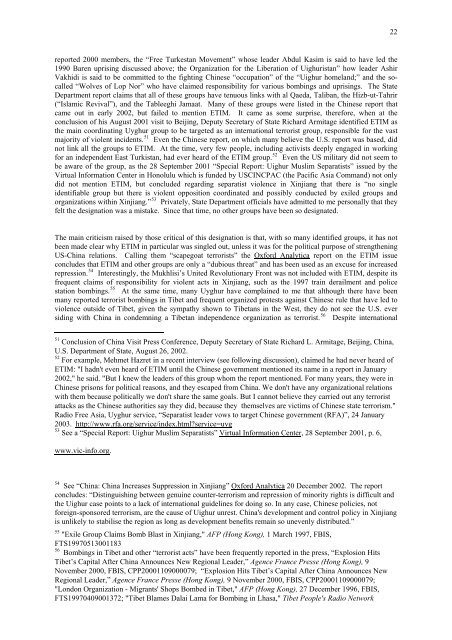Dru C. Gladney, Ph.D. - House Foreign Affairs Committee Democrats
Dru C. Gladney, Ph.D. - House Foreign Affairs Committee Democrats
Dru C. Gladney, Ph.D. - House Foreign Affairs Committee Democrats
You also want an ePaper? Increase the reach of your titles
YUMPU automatically turns print PDFs into web optimized ePapers that Google loves.
22<br />
reported 2000 members, the “Free Turkestan Movement” whose leader Abdul Kasim is said to have led the<br />
1990 Baren uprising discussed above; the Organization for the Liberation of Uighuristan” how leader Ashir<br />
Vakhidi is said to be committed to the fighting Chinese “occupation” of the “Uighur homeland;” and the socalled<br />
“Wolves of Lop Nor” who have claimed responsibility for various bombings and uprisings. The State<br />
Department report claims that all of these groups have tenuous links with al Qaeda, Taliban, the Hizb-ut-Tahrir<br />
(“Islamic Revival”), and the Tableeghi Jamaat. Many of these groups were listed in the Chinese report that<br />
came out in early 2002, but failed to mention ETIM. It came as some surprise, therefore, when at the<br />
conclusion of his August 2001 visit to Beijing, Deputy Secretary of State Richard Armitage identified ETIM as<br />
the main coordinating Uyghur group to be targeted as an international terrorist group, responsible for the vast<br />
majority of violent incidents. 51 Even the Chinese report, on which many believe the U.S. report was based, did<br />
not link all the groups to ETIM. At the time, very few people, including activists deeply engaged in working<br />
for an independent East Turkistan, had ever heard of the ETIM group. 52 Even the US military did not seem to<br />
be aware of the group, as the 28 September 2001 “Special Report: Uighur Muslim Separatists” issued by the<br />
Virtual Information Center in Honolulu which is funded by USCINCPAC (the Pacific Asia Command) not only<br />
did not mention ETIM, but concluded regarding separatist violence in Xinjiang that there is “no single<br />
identifiable group but there is violent opposition coordinated and possibly conducted by exiled groups and<br />
organizations within Xinjiang.” 53 Privately, State Department officials have admitted to me personally that they<br />
felt the designation was a mistake. Since that time, no other groups have been so designated.<br />
The main criticism raised by those critical of this designation is that, with so many identified groups, it has not<br />
been made clear why ETIM in particular was singled out, unless it was for the political purpose of strengthening<br />
US-China relations. Calling them “scapegoat terrorists” the Oxford Analytica report on the ETIM issue<br />
concludes that ETIM and other groups are only a “dubious threat” and has been used as an excuse for increased<br />
repression. 54 Interestingly, the Mukhlisi’s United Revolutionary Front was not included with ETIM, despite its<br />
frequent claims of responsibility for violent acts in Xinjiang, such as the 1997 train derailment and police<br />
station bombings. 55 At the same time, many Uyghur have complained to me that although there have been<br />
many reported terrorist bombings in Tibet and frequent organized protests against Chinese rule that have led to<br />
violence outside of Tibet, given the sympathy shown to Tibetans in the West, they do not see the U.S. ever<br />
siding with China in condemning a Tibetan independence organization as terrorist. 56 Despite international<br />
51 Conclusion of China Visit Press Conference, Deputy Secretary of State Richard L. Armitage, Beijing, China,<br />
U.S. Department of State, August 26, 2002.<br />
52 For example, Mehmet Hazret in a recent interview (see following discussion), claimed he had never heard of<br />
ETIM: "I hadn't even heard of ETIM until the Chinese government mentioned its name in a report in January<br />
2002," he said. "But I knew the leaders of this group whom the report mentioned. For many years, they were in<br />
Chinese prisons for political reasons, and they escaped from China. We don't have any organizational relations<br />
with them because politically we don't share the same goals. But I cannot believe they carried out any terrorist<br />
attacks as the Chinese authorities say they did, because they themselves are victims of Chinese state terrorism."<br />
Radio Free Asia, Uyghur service, “Separatist leader vows to target Chinese government (RFA)”, 24 January<br />
2003. http://www.rfa.org/service/index.htmlservice=uyg<br />
53 See a “Special Report: Uighur Muslim Separatists” Virtual Information Center, 28 September 2001, p. 6,<br />
www.vic-info.org.<br />
54 See “China: China Increases Suppression in Xinjiang” Oxford Analytica 20 December 2002. The report<br />
concludes: “Distinguishing between genuine counter-terrorism and repression of minority rights is difficult and<br />
the Uighur case points to a lack of international guidelines for doing so. In any case, Chinese policies, not<br />
foreign-sponsored terrorism, are the cause of Uighur unrest. China's development and control policy in Xinjiang<br />
is unlikely to stabilise the region as long as development benefits remain so unevenly distributed.”<br />
55 "Exile Group Claims Bomb Blast in Xinjiang," AFP (Hong Kong), 1 March 1997, FBIS,<br />
FTS19970513001183<br />
56 Bombings in Tibet and other “terrorist acts” have been frequently reported in the press, “Explosion Hits<br />
Tibet’s Capital After China Announces New Regional Leader,” Agence France Presse (Hong Kong), 9<br />
November 2000, FBIS, CPP20001109000079; “Explosion Hits Tibet’s Capital After China Announces New<br />
Regional Leader,” Agence France Presse (Hong Kong), 9 November 2000, FBIS, CPP20001109000079;<br />
"London Organization - Migrants' Shops Bombed in Tibet," AFP (Hong Kong), 27 December 1996, FBIS,<br />
FTS19970409001372; "Tibet Blames Dalai Lama for Bombing in Lhasa," Tibet People's Radio Network











![Transcript [PDF] - House Foreign Affairs Committee Democrats](https://img.yumpu.com/34524080/1/190x245/transcript-pdf-house-foreign-affairs-committee-democrats.jpg?quality=85)



